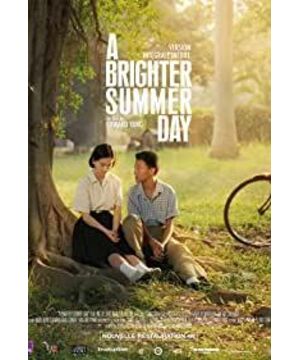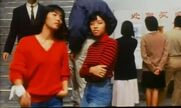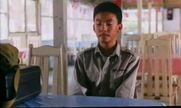If the selection of the best Chinese in the century is selected, the film directed by Yang Dechang will undoubtedly be selected into the top ten.
From the point of view of the first impression, too many ordinary audiences say Xiaoming is a bitch, and I have a completely negative attitude towards this. I think Xiao Ming is the most realistic, moving, sympathetic and loving woman in this work. Based on the aesthetics of today's idol dramas, Xiao Ming's facial features can undoubtedly only be performed as a group. If you don't believe me, we can try to imagine that Xiaoming is standing beside Di Ali Gerba. But in the play, because the proportion of male characters is higher, and most of the viewpoints are from the fourth-grade male characters, and there is hardly a female character with delicate facial features in the play, therefore, the white and tender little ones are obviously particularly dazzling. It has the feeling of green leaves lining red flowers.
Most of the audiences who said Xiaoming bitch, and those who spoke for Zhang Zhen's character, did not understand the society and did not understand the film, or to be specific, they did not understand women. Xiao Ming, a 13-year-old girl, is in the second stage of child psychological stereotypes, but her family suffers from the absence of her father (we have reason to believe that her father was killed in the war), and her mother is seriously ill (this means that Xiao Ming may become a child at any time. orphan). In order to survive and protect her mother, she had to choose to rely on various men with strength and resources. Director Yang Dechang's presentation of Xiao Ming's ambiguous history in this work is extremely euphemistic, but we have every reason to guess that 13-year-old Xiao Ming has either willingly or compelled to have sex with some of the six men in the film. This conjecture is really terrifying. Here, I have to ask the audience of Xiaoming Bitch, when you were 13 years old, did you or your female classmates have such girls? If so, do you understand why they chose such a life? After watching the film repeatedly, we can find that one of Xiao Ming's real emotions is honey, and the other is Xiao Si, who she feels very much like honey. However, the heavy pressure of real life and the precarious uneasiness forced Xiao Ming's desire to survive as a human being and the sense of family mission to take care of his mother. At that time, young Xiao Ming had no choice. In fact, the seaweed in "Dwelling" is just a different age from Xiao Ming.
To put it further, the audience can use this film to understand women's psychological ups and downs, feel the needs of women's sense of security, understand the subtext of women's words, and understand women's emotions, in addition to appreciating the audio-visual and reflecting on social history. A set of perceptual educational materials that do not speak the truth can be regarded as a by-product of this film.
The film has a strong documentary style. In the era when this film was made, the directors at the time had a creative idea that was dedicated to enhancing the sense of reality. The way of expression in this film is extremely restrained. The lighting of the whole film basically uses active light, or only uses key props - flashlights that are compared to Xiao Si's eyes that perceive society. The black part of the film due to lack of latitude makes the picture dark, relying on the silhouette in the dark, relying on the auditory fighting, screaming, and ambient sound to complete the picture of the plot, and completely surpasses the effect that high-key lighting can achieve. . In addition, there is almost no passive music in this work, all the music and sound effects are active, which is one of the labels of realism movies.
It is worth mentioning that, I personally think that the scene where Xiao Si and Xiao Ming entered the studio at night was too beautiful with Chinese culture. As if holding a lute, the air is full of romantic feelings from the rippling interrogation and speculation between the two sexes. In this kind of scene that can be sprinkled with sugar, as long as it is put into commercial films and TV dramas, the director will immediately spread the BGM, close-ups directly hit the faces of the two, and then come to a slow motion around the upgrade. . . Alas, there is no corruption without silt, Yan Xian director Yang Dechang and other masters like the lotus in the hands of Yayan.
The frame and frame composition used extensively in the film not only enriches the sense of hierarchy, but also has a profound meaning. This is a unique spatial modeling technique in Chinese classical painting style. As long as we read the interior theme paintings in the classical Chinese paintings, we can often see that in the classical Chinese paintings, unlike the perspective method derived from the development of physics in the West, curtains, gauze, Windows and doors create a unique sense of hierarchy.
The most amazing thing about director Yang Dechang in this work is the scheduling and line design of the off-painting space. From the ubiquitous details, and the dialogue with the characters outside the frame, the audience is immersed in a very real world. Although people and events outside the screen are often unrelated to the main plot, they make the whole work seem more realistic than the documentary. From a certain point of view, there is a feeling of watching the live broadcast of sneak shots.
On the surface, this is a story about an impulsive and love-killing adolescent teenager who is close to the ink and has been brought up. And Director Yang’s father’s perspective and Xiao Ming’s mother and daughter’s perspective interspersed in the film constantly make the audience reflect on the meaning behind all the seemingly easy details, and then reveal all the misfortunes stemming from the existential crisis of Xiao Ming, who is only 13 years old , the lack of social security, the confusion and confusion of the rule of law in the adult world and the purpose of life.
This work is probably most often compared to "Sunny Days", and many audiences have complained that many of the scenes and plots of director Jiang Wen have borrowed from this work. It's all boring in my opinion. The two sides of the Taiwan Strait are originally a family, and their cultural values have lasted for thousands of years and have long been rooted in everyone's DNA. Let's talk about the instructors who repeatedly appeared in the film talking about Shandong and Qingdao with others, which shows the homesickness of the people at that time. Similar political era background, similar culture, the two works focus on similar adolescent teenagers, of course, there are many similarities in what they will do. The obvious difference is that director Jiang Wen's works have a stronger sense of power, reflecting the living conditions of the people in mainland China during that period.
The family can reflect the values of a famous family, and the living conditions of children can reflect the influence of an era on their growth, thereby showing the ups and downs of the era. I believe that's why both directors have chosen to focus on teenagers and describe so many gangster plots.
In the scene where the father beat the second child, he repeatedly scolded the second child for being shameless and unpromising, as if it was a scolding of himself because of the collapse of his values. Reminiscent of the influence of Taiwan's new film director Hou Hsiao-hsien, there is a similar scene in Hirokazu Kore-eda's movie "Deeper than the Sea". When Abe is betting on horses, he keeps yelling at the players who bet on his own, "You are afraid What, give me a win or lose." The two similar plots are the external manifestations of the characters' intense emotions.
View more about A Brighter Summer Day reviews











